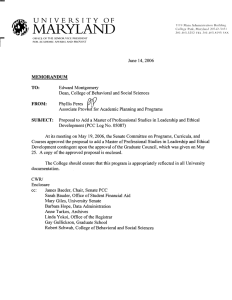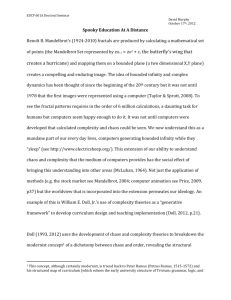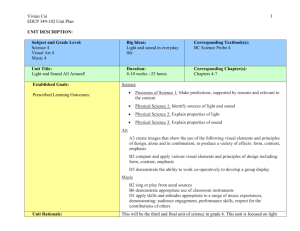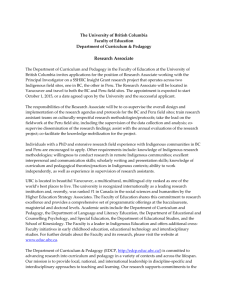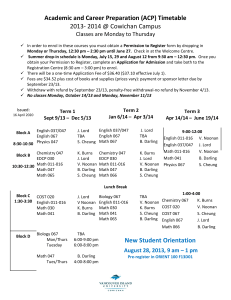Document 14300673
advertisement
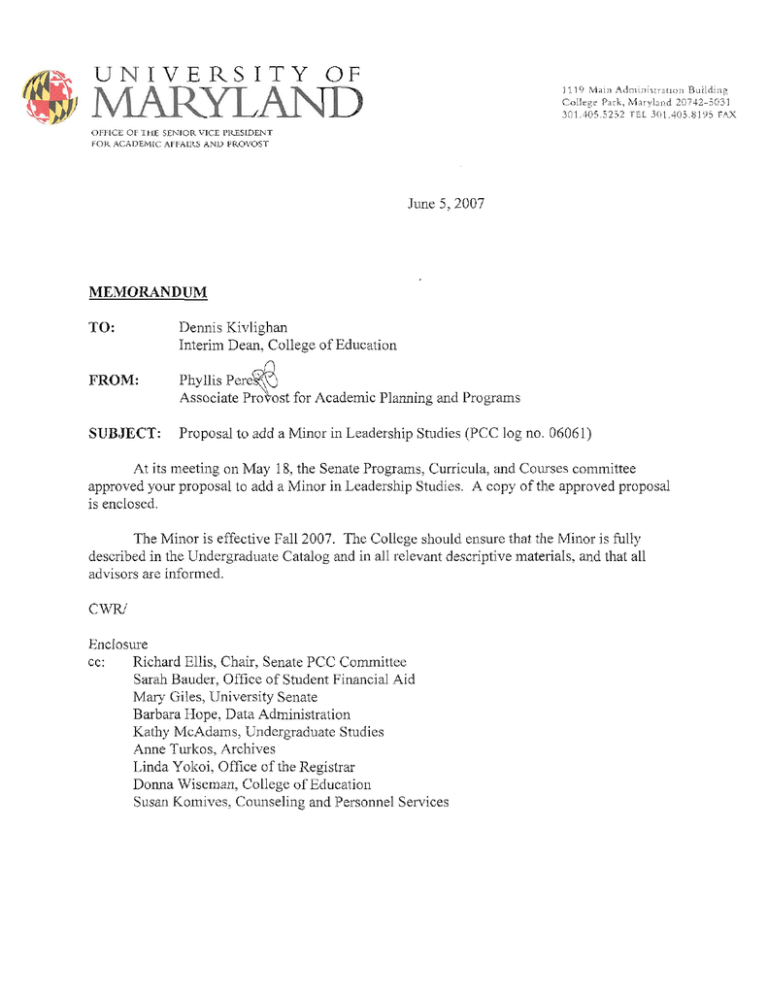
Counseling and Personnel Services (EDCP) Minor in Leadership Studies University of Maryland Program Proposal 5/07 Rationale The proposed Counseling and Personnel Services (EDCP) Minor in Leadership Studies builds on the University of Maryland’s established national reputation for leadership research and practice. Through EDCP, Maryland has been offering courses in college student leadership development since1971 and was one of the first institutions nationally to develop a curricular leadership program. Home to the National Clearinghouse for Leadership Programs (NCLP), the James MacGregor Burns Academy of Leadership, and the International Leadership Association (ILA), the University of Maryland continues to recruit and attract scholars, practitioners, and students interested in the study and application of socially-responsible leadership. These units will advise the Leadership Studies minor. The extensive sequence of EDCP student leadership development courses (25+ course sections serving over 400 students a year) and faculty expertise in the #1 ranked Counseling and Personnel Services Department make EDCP a natural home for the minor. EDCP will sponsor the curriculum, advise students in the minor, and have oversight of faculty and instructor involvement. The proposed EDCP Minor in Leadership Studies connects directly to the undergraduate mission of the institution, and reinforces existing institutional leadership initiatives. The President’s Promise Initiative guarantees all Maryland undergraduate students will have the opportunity “for leadership that only a university located adjacent to the nation’s capital can provide”. In 2006, then Vice-President for Research Gansler convened a leadership scholarship network to unite faculty from multiple disciplines in sharing their leadership research. Maryland’s increased emphasis on global leadership and study abroad/international experiences require that students examine leadership across cultures and contexts. The recently established Master’s of Professional Studies (MPS) program in Leadership Education and Development in conjunction with the U.S. Naval Academy has placed Maryland on the map for credentialing leadership education; EDCP is one of the departments participating in that program. There is also evidence that students have interest in integrating their curricular leadership experiences. Nearly a dozen students have declared a leadership major through the Individual Studies Program (IVSP) in recent years. Existing EDCP leadership courses continue to be filled to capacity, often with extensive waitlists. Spaces for students in the minor will be assured through designated sections for those enrolled in the minor. EDCP’s successful track record of enrollment and high-scoring IDEA course evaluations, coupled with employers seeking leadership knowledge, skills and experiences in Maryland graduates, are all indicators of the success of such a program. Nationally, leadership studies is an emerging field of study. From the development of the first major in leadership studies at the University of Richmond in 1994, there has been a burgeoning of academic leadership programs so that more than 100 such programs exist today. Majors are offered at institutions such as The Ohio State University and Texas A&M University. Many of the University of Maryland’s peer institutions offer such programs. For example, the University of North Carolina offers a four year leadership development program tied to curricular offerings called the North Carolina Fellows 1 Program. A partial list of other institutions that offer an undergraduate leadership minor include: California State University, Chico Central Michigan University East Tennessee State University Fort Hays State University Humboldt State University Indiana University Kansas State University Kansas University Marietta College Marquette University Middle Tennessee State University Ohio State University Pennsylvania State University Regent University St. Norbert College Seattle Pacific University Texas A&M University University of California at Davis University of Central Florida University of Colorado at Boulder University of Denver University of Kansas University of Minnesota University of Missouri University of Nebraska, Lincoln University of North Carolina, Chapel Hill University of North Carolina, Wilmington University of Rhode Island University of Richmond University of South Dakota University of South Florida University of Southern California University of Southern Maine University of Texas, Austin Virginia Military Institute Virginia Polytechnic Institute and State University Washington State University Wright State University Benefits to EDCP and the College of Education The Counseling and Personnel Services Department in the College of Education is a natural home for the leadership minor. Drawing from faculty expertise in the areas of student development theory, student learning, motivation, career development, selfefficacy, cognitive and identity development, EDCP has a 35 year history of offering leadership classes to undergraduate students at the University of Maryland. Now serving over 400 undergraduate students a year, the EDCP leadership courses allow students from all majors the chance to engage with diverse theories and perspectives on leadership and to apply these skills across multiple contexts including leadership in the context of their student organizations and chosen career fields. It will also add to departmental visibility across campus and nationally. Faculty in Counseling and Personnel Services have expertise in the field of leadership development. Current faculty research projects include the Multi-Institutional Study of Leadership (Dr. Susan R. Komives & John P. Dugan, PIs) that gathered data on student leadership initiatives from 63,000 students from 52 diverse campuses nationwide and the National Study of Living-Learning Programs (Dr. Karen K. Inkelas, PI) that examines the effect of living-learning programs on student leadership, among other factors. Dr. Susan R. Komives is the co-author of a best-selling textbook for college student leadership development, Exploring Leadership. She has taught an annual graduate course for those preparing to be college student leadership educators since 1994. These students go on to become TAs in the Maryland leadership program. The EDCP Minor in Leadership Studies also serves as a complement to other leadership-focused departmental outreach efforts such as the Navy LEAD Program, offering leadership courses at Shady Grove, and partnering with the American Reads/America Counts federal work study program. 2 Description of the EDCP Minor in Leadership Studies The EDCP Minor in Leadership Studies promotes college student leadership development by educating undergraduate students for and about leadership in a complex world. The goal of the minor is to prepare students to serve effectively in formal and informal leadership roles in campus, local, national, and global contexts. Faculty and students in the minor are dedicated to advancing the field of leadership studies by building upon and critically evaluating existing theoretical, research-based, and practical knowledge. Core courses in the minor are sequenced to meet increasingly complex sets of learning outcomes across cognitive, personal development, and group/organizational domains. Students in the minor are exposed to diverse theories and perspectives on leadership and are encouraged to apply analytical skills to develop their own working philosophy of leadership that will serve them in organizational and career contexts. Civic engagement and multicultural competence are viewed as necessary requirements for leadership. Overall objectives for the minor include: • • • • Provide students with a curricular opportunity to pursue an interest in leadership while completing their major requirements. Enable students to connect leadership to their identity, their major, and to a particular leadership context or community of practice. Prepare students to serve effectively in formal and informal leadership roles in campus, local, national, and global contexts. Capitalize on existing leadership associations, scholarship, and institutional initiatives to position the University of Maryland at the vanguard of the field of leadership studies. The EDCP Minor in Leadership Studies consolidates existing EDCP leadership courses into a coherent program that consists of 18 credit hours. • • • • • • Nine of these credit hours come from three required courses (EDCP 217, 315, and 417) that must be taken in sequence. Three credits come from selecting an EDCP 318 or EDCP 418 course electives. The remaining six credits can be selected from a list of approved electives offered in numerous departments across campus. The goal for the elective courses is that students begin to connect leadership to their identity, their major, and to a particular leadership context, and to acknowledge the multi-disciplinary nature of leadership. Students must meet prerequisites for approved courses. At least nine credits must be at the 300-400 level. No more than six credits can also be applied to a student’s major, and no more than six credits may be taken at an institution other than the University of Maryland College Park. No course with an earned grade below C may count towards the minor. Sections of EDCP leadership courses will be designated for those in the minor. If students in the minor have schedule conflicts with those designated sections, they may enroll in open sections to meet minor requirements. 3 Eligibility and Application Process Based on previous enrollment numbers that average 400 students a year participating in one or more of 25+ EDCP leadership classes, it is our estimate that the EDCP Minor in Leadership Studies will attract approximately 10% of that student population, or 35-40 students per year. In order to apply for the minor in Leadership Studies, students must have: 1. Completed at least 30 credit hours prior to application to the program. 2. Be in good academic standing. 3. Completed EDCP 217 with a C or better. 4. Met application deadlines: Applications will be accepted beginning on Oct. 1 and March 1 for admission in the subsequent semester. The first 20 qualified applicants will be accepted on a first-come, first-serve basis each semester. Complete applications must be submitted to the Counseling and Personnel Services Main Office (3214 Benjamin). 5. Been admitted into the Minor prior to the completion of the final 9 credits of Minor course work. Application to the Minor Interested students may submit an application to the Counseling and Personnel Services Main Office (3214 Benjamin). Application forms will be available from the Counseling and Personnel Services Main Office and the Leadership Program Office in the Office of Campus Programs, Adele H. Stamp Student Union. When admitted, the student should declare their minor with the college responsible for their major, as noted in the Undergraduate Catalog, “as early as possible, but in no case later than one full academic year before the expected date of graduation”. Faculty Coordinator/Advisor Susan R. Komives Associate Professor Counseling and Personnel Services 3214 Benjamin Building Phone: x42870 Fax: x59995 Email: Komives@umd.edu Resource Requirements and Availability The EDCP Minor in Leadership Studies requires little new resource allocation. Dr. Susan R. Komives, Associate Professor in EDCP, will serve as coordinator of the Minor as part of her budgeted faculty time. Resource Director of the Minor Comment Dr. Susan R. Komives, Associate Professor; on load Graduate Assistant (new) 12 month, 20 hour per week appointment. Funded by EDCP from course registrations from January and summer sessions. Leadership Curriculum Coordinator EDCP currently funds 50% of a full time Leadership Curriculum Coordinator in partnership with the Leadership Program, Office of Campus Programs, Stamp Student Union 4 Instructors Additional core EDCP faculty and close affiliates teach and coordinate the main required courses in the program with the assistance of GAs and TAs. These individuals include: EDCP 217 EDCP 315 EDCP 318 EDCP 417 EDCP 418 Library Resources EDCP Associate Professor Susan R. Komives EDCP Department Chair Dennis Kivlighan EDCP Affiliate Instructor Craig Slack EDCP Affiliate Instructor Julie E. Owen EDCP Associate Professor Susan R. Jones Scholarly resources include the extensive holdings in leadership studies in McKeldin Library. In addition, the Lucille Maurer Leadership Library in the James MacGregor Burns Academy of Leadership houses a non-circulating collection of research and scholarship on leadership that is open to the University of Maryland community, as well as members of the Maryland General Assembly. 5 Proposed Core Sequence Students in the EDCP Minor in Leadership Studies are required to complete each of these three courses in sequential order. Courses are taught and coordinated by core EDCP faculty with the assistance of Graduate and Teaching Assistants where appropriate. EDCP 217: Introduction to Student Leadership Proposed new course Course to be cross-listed as a core – IE (interdisciplinary and emerging issues) Focus Developing intra- and interpersonal competence Faculty Dr. Susan R. Komives Associate Professor, EDCP Coordinator komives@umd.edu Text Knowledge/ Cognitive Learning Goals Personal Development Learning Goals Exploring Leadership: For College Students Who Want to Make a Difference [2nd ed.] Komives, Lucas, & McMahon • explore leadership myths and realities • understand the multidisciplinary roots of leadership studies. • learn about the shift between industrial /post-industrial models • begin to value leadership as a process, not just position • in-depth exposure to the relational leadership model & components • • • • • • Group/ Organizational Learning Goals Context for Application • • • Gain knowledge about self Develop consciousness of self; self-efficacy; feelings of mattering; manage personal emotions; values clarification; understand cultural heritage Apply self-knowledge Practice congruence; commitment; identify passions; discuss cultural differences and issues Learn to value ethical thought and action Develop critical thinking skills Learn to engage constructively with others Practice collaboration; controversy with civility/principled dissent; engage across difference Understand group roles, group dynamics, and group decision making Focus primarily on individual student development and small group application 6 EDCP 315: Student Leadership in Groups and Organizations Focus Acquiring and integrating leadership knowledge within group and organizational contexts so that students can navigate organizational environments and apply leadership in diverse communities of practice and career contexts. Faculty Dr. Dennis Kivlighan EDCP Department Chair Coordinator dennisk@umd.edu Pre-requisite Texts Knowledge/ Cognitive Learning Goals EDCP 217: Introduction to Student Leadership Leadership [3rd ed.], Northouse; Leading Organizations, Hickman; Fifth Discipline, Senge; Leading Teams: Setting the stage for great performances, Hackman • Examine etymological origins of leadership • Discriminate between popular notions of leadership, models, & empirically tested theories • Develop working knowledge of history of leadership and the evolution of leadership theory including: great man; trait; behavioral/style; situational/contingency; influence/charisma; reciprocal/relational; change and chaos theories • Integrate leadership learning across the disciplines • Understand concepts related to groups and organizations such as collective efficacy, organizational citizenship, etc. Personal Development Learning Goals • • Group/ Organizational Learning Goals • • • • • • • Context for Application Begin to develop personal philosophy of leadership Understand nature of power and influence, as well as oppression Develop cross-cultural communication skills Hone effective written and oral communication skills Apply leadership theory in group environments Leadership Practices Inventory Learn to develop common purpose in groups Study elements of strategic planning including development of mission, vision, goal and outcome statements; SWOT analysis and stakeholder identification Focus on collective efficacy and group potency for change Begin to look beyond small groups to more complex organizations 7 EDCP 417: Leadership Capstone Seminar Focus Understanding systems thinking and applying leadership in multiple contexts Faculty Julie Owen EDCP Affiliate Instructor Coordinator jeowen@umd.edu Pre-requisite Text Knowledge/ Cognitive Learning Goals Personal Development Learning Goals Group/ Organizational Learning Goals EDCP 315: Student Leadership in Groups and Organizations Leading Change, Kotter; Leading in a Culture of Change, Fullen; Leaders Companion, Wren; Coursepack • In-depth exploration of modern families of leadership theory including: transformational/charismatic leadership; social change and civic engagement models; learning organizations and systems theories; shared leadership; meta-analysis and movement towards general theory of leadership • Develop cognitive complexity in thinking about leadership • Analyzing social movements and understanding systemic change • • • • • • • • • • • Context for Application Hone and apply personal philosophy of leadership Develop life-long commitment to the application of ethical leadership Understand roots of social responsibility and social capital Developing a leadership action plan for school/work transition Understand organizational structures and political systems Multicultural organization development Community organizing and community building Learn to navigate complex systems Practice coalition building and grass roots activism Apply principles of organizational lifecycle and organizational sustainability Creating and sustaining ethical organizational climates Applying leadership in complex systems and across contexts EDCP Minor Electives Students in the EDCP Minor in Leadership Studies are required to complete one course from the list below. EDCP 318 – Applied Contextual Leadership Faculty Coordinator: Craig Slack, EDCP Affiliate Instructor cslack@umd.edu The courses address how leadership models and theories are applied in specific contexts. In-depth study and analysis on the context and its relationship to leadership will be the basis for the course. Topics may include: 8 Leadership and Community Service – Course designed to examine the relationships between service and socially responsible leadership. Students will engage in community service and critical reflection in order to gain a deeper understanding of issues related to diversity, social justice, community, and civic engagement. Constituent-Based Leadership – Course designed for Student Government legislators that focuses on the unique nature of leadership in a constituent-based organization. Connections between leadership, university governance, operations, and functions will be explored. EDCP 418 – Leadership & Identity Faculty Coordinator: EDCP Associate Professor Susan Jones and/or new CSP faculty member sjones4@umd.edu The special topics and leadership course will address a single topic related to leadership throughout the semester. In-depth study and analysis on the topic and its relationship to leadership will be the basis for the course. Topics may include: Asian Pacific Americans and Leadership: Influences and Issues - Students enrolled in this class will have the opportunity to examine how the Asian Pacific American identity impacts leadership style. Students will study issues of activism, culture and history as they relate to leadership and Asian Pacific Americans. Latina and Latino Leadership, Leaders and the Movement – Students enrolled in this class will have the opportunity to examine how Latina and Latino identity impacts leadership style. Students will study issues of activism, culture and history as they relate to leadership and Latina and Latino culture. African-American Leadership, Leaders and the Movement - Students enrolled in this class examine the effect of race and ethnicity on leadership. Specifically, they explore the concepts and differing meanings of "leader and leadership" within the African-American community and society at large. Leadership and Ethnicity - Students enrolled in this class examine the effect of race and ethnicity on leadership. Issues of leadership are examined as influenced by cultural and historical events. Women’s Leadership - Students will develop an understanding of women’s leadership and women’s ways of influencing organizations. Participants will explore the dynamic of power and leadership and how women’s development and psychological theory have influenced both of these constructs. Electives Proposed from EDCP and Other UM Departments Leadership scholar Joseph Rost (1993) calls for leadership studies to expand beyond single-discipline traditions and to embrace inter- or multi-discipline approaches. He states “organizations and societies in the future, with their collaborative, community, and global orientations, may not be hospitable to a concept of leadership that is grounded in only one academic discipline” (p. 182). Indeed, leadership processes can and should be studied, understood, and applied in a variety of contexts. To encourage students to view leadership from a variety of perspectives, and to promote the application of leadership 9 across diverse contexts, students in the EDCP Minor in Leadership Studies are required to complete two courses from the list of pre-approved electives below. One elective must be from the 200 level and one from the 300 or 400 level. Petitions can made to Program Director/Advisor Dr. Komives to substitute independent study experiences, study abroad, credit-bearing internships, and other leadership related curricular experiences for one of the required two elective courses. Note: Courses that are starred below are open only to students in particular majors or designated programs. The intention here is to partner with particular academic departments so that their students can complement departmental studies with the EDCP Minor in Leadership Studies. For example, students accepted to the Smith School of Business who study entrepreneurship and organizational theory for their major can count those classes toward the EDCP Minor in Leadership Studies where they examine the similarities and differences between concepts of leadership and management, and how structural views of organizations interact with organizational leadership theories. Letters of support from the following departments are also included in this proposal: BMGT, COMM, EDPL, and PUAF (Academy of Leadership). Some of these courses have prerequisites. Pre-approved courses from the following programs may also count as electives: African-American Studies Department (AASD), Asian American Studies (AAST), College Park Scholars Program (CPSP), East Asian Studies, Latin American Studies (LASC), Lesbian, Gay, Bisexual, and Transgender Studies Program (LGBT), Women’s Studies (WMST). Potential electives are listed below. A brief rationale for the purposeful selection of courses from selected departments is included. Education, Counseling, & Personnel Services (EDCP courses) Courses in education and counseling expose students to theories of influence, attribution, individual and collective efficacy, interaction and social learning theories, all which shape student leadership development. EDCP 220 EDCP 386 EDCP 420 EDCP 489 EDCP 498 Introduction to Human Diversity in Social Institutions Experiential Learning Advanced Topics in Human Diversity and Advocacy Field Experiences in Counseling and Personnel Services Special Problems in Counseling and Personnel Services Agriculture & Natural Resources Colleges of agriculture/extension have long been a home for youth leadership education. Courses focus on developing leadership in youth and contemporary issues in leadership. AGNR 323 Developing Youth Leadership Programs Behavioral and Social Sciences Courses from the behavioral and social sciences focus on the processes of leadership – the behaviors, skills, and styles that are useful in accomplishing tasks and developing people. *BSOS 301 Leadership in a Multicultural Society *BSOS 388 CIVICUS Peer Dialogue Leader Program 10 Business and Management The functions of leadership and management are overlapping – both processes involve influencing a group of individuals toward goal attainment. Courses such as entrepreneurship address the role of vision and change in leadership processes. *BMGT 361 Entrepreneurship *BMGT 364 Management and Organization Theory Communication Leadership is often referred to as a special form of communication that modifies the attitudes and behaviors of others in order to meet shared group goals and needs (Hackman & Johnson, 2004). By studying intrapersonal and organizational communication, students learn to analyze processes of influence essential to leadership. COMM 420 Theories of Group Discussion COMM 424 Communication in Complex Organizations COMM 461 Voices of Public Leadership in the Twentieth Century COMM 469 The Discourse of Social Movements COMM 498 Communicating Leadership Education Policy and Leadership EDPL 338 Inter-group Dialogue Courses Gemstone *GEMS 208 Special Topics in Leadership and Team Development Journalism The investigation of ethics is critical when focusing on leadership. Issues such as the moral development of individuals, the influence of role models, values-driven leadership, and creating ethical organizations all must be addressed. Examining the application of ethics in a particular discipline, field, or context is essential to answering the question of “leadership for what purpose?”. *JOUR300 Journalism Ethics Psychology The study of psychology and psychodynamics sheds insight into individual motives for leadership as well as how leadership occurs in groups and organizations. The pathology of leadership has also been examined. PSYCH 221 Social Psychology PSYC334 Psychology of Interpersonal Relationships PSYC361 Survey of Industrial and Organizational Psychology Public Policy Courses in public policy address political theories of leadership, conflict and coalitionbuilding, and systems of governance. *PUAF 201 Leadership for the Common Good *PUAF 202 Contemporary Issues in Leadership and Public Policy PUAF 359C Contemporary Issues in Political Leadership and Participation: Advocacy in the American Political System PUAF 359R Contemporary Issues in Political Leadership and Participation: African American Leadership PUAF 359W Contemporary Issues in Political Leadership and Participation: Women in Leadership 11 Assessment Plan In line with the Middle States mandate for clear assessment of student learning outcomes, the EDCP Minor in Leadership Studies seeks to assess a diverse array of learning both within and across individual courses. Guided by the goal of educating students for and about leadership, the following assessments are proposed: Student Learning Outcomes Students will learn to: A. Cognitive • Understand the multidisciplinary roots of leadership studies. • Develop working knowledge of history of leadership and the evolution of leadership theory including: great man; trait; behavioral/style; situational/contingenc y; influence/charisma; reciprocal/relational; change and chaos theories • Describe the shift between industrial /post-industrial leadership models • Explain the relational leadership model & components B. Personal Development • Develop consciousness of self; self-efficacy; values clarification • Apply self-knowledge • Practice congruence; commitment • Learn to value ethical thought and action • Develop critical thinking skills C. Group Skills • Learn to engage constructively with others • Practice collaboration; controversy with civility/principled Assessment Measures and Criteria Assessment Schedule A. Cognitive Proficient ratings on leadership learning outcomes from the Socially Responsible Leadership Scale (SRLS-2). A. Cognitive The SRLS-2 pre-test will be given at the beginning of EDCP 217 and the post-test will be administered at the completion of EDCP 417. B. Personal Development Successfully complete a personal leadership development portfolio. B. Personal Development Components of student leadership portfolios will be developed in EDCP 217 and 315 and will be evaluated as part of the capstone/EDCP 417 experience. C. Group Skills Peer and instructor assessments (85% of students assessed will receive ratings of proficient or above on 80% of the assessment criteria.) C. Group Skills As part of the EDCP 315 group project, students are required to evaluate their own performance and that of their group members using a rubric to evaluate group skills. Students rank themselves and 12 • dissent; engage across difference Understand group roles, group dynamics, and group decision making their peers as “developing”, “proficient”, or “accomplished” on each of the rubric categories. At the completion of the group project, the instructor of the course also will evaluate each group member, as well as each group, on the rubric objectives. The instructor feedback, along with that of peers, is shared with the student groups, along with an individual and group grade for the project. Proposed Process/Timeline Fall 06 EDCP CPAD meeting CAPS faculty meeting Spring 07 College PCC Spring 07 Senate PCC Advertise to incoming students About Leadership Studies There was a time when leadership scholars and educators were often queried about the nature of their work and its place in the academy. Much of the messiness around leadership as a field of study can be traced to confusion about the inter- and multidisciplinary nature of the undertaking (Rost, 1993; Yukl, 2006). This was famously captured in James MacGregor Burns’ remark that “leadership is one of the most observed and least understood phenomena on earth” (p.7). Yet increasingly, organizations and communities are decrying a lack of leadership as one of the most pressing problems in contemporary civic life (W.K. Kellogg, 2000). Mounting social problems, the shift from an industrial to knowledge society, and new skills required for functioning in a global context, all require that college graduates emerge prepared to tackle the leadership challenges before them. Indeed, Alexander and Helen Astin offer that “the study of leadership …can open up new possibilities for transformation and change” (W.K. Kellogg, 2000, p. v). Rost (1993) concurs stating that “leadership scholars need to develop an academic presence as an interdisciplinary area of studies serving both undergraduate and graduate students in specialized programs that deal with the study and practice of leadership in organizations and society” (p. 182). The reality is that leadership studies is an emerging field of study in academia (Brungardt, Greenleaf, Brungardt, & Arensdorf, 2006; Komives, Lucas, & McMahon, 2007). From the development of the first major in leadership studies at the University of Richmond in 1994, there has been a burgeoning of academic leadership programs so that more than 100 such programs exist today (Sorenson, 2002). Leadership majors, leadership minors and certificates, graduate degrees, and Ph.Ds in leadership studies 13 abound. Critics of leadership studies argue that there is no comprehensive central perspective that clarifies the field of leadership studies when, in fact, there is increasing consistency as to what theories comprise the evolution of leadership studies (Bass, 1990; Northouse, 2004; Yukl, 2006). Owen, Dugan, Berwager, and Lott (2006) point out that leadership is a social process and “like other social sciences, there are comprehensible processes that can be studied, understood, and applied in a variety of contexts. It is the work of the leadership educator to help students identify the core knowledge and practices of leadership, and to make meaning of it in their own lives and the world around them” (p. 55). Indeed, leadership has been studied extensively from scholars in multiple disciplines using both quantitative and qualitative methodology. Collectively, the research findings on leadership provide a far more sophisticated and complex view of this phenomenon than most of the simplistic views presented in the popular press about leadership, and provide a sound empirical basis for further study (Northouse, 2004). Bass (1990) cites over 7,500 research studies on leadership and describes the mounting theory, method, and evidence about leadership as “an antidote for the arguments of those continuing to bemoan the supposed unknowable, elusive, mysterious nature of leadership” (p.915). Others question whether leadership is, in fact, teachable. Gardner (1990) offers that leaders are not born with innate skills or characteristics that predestine them to be leaders. Because the tasks and processes of leadership can be described, they can also be learned. In the preface to Harvard’s Sharon Daloz Parks new book, Leadership Can Be Taught, leadership scholar Warren Bennis states “any person who has studied leadership has found it is not a predetermined affair. Many of the most significant shapers of history were themselves shaped gradually…Leadership can (and often must) be learned by those who would hope to practice it” (2006, p. ix). Norum (2006) describes the presence of places for discourse as one of the normative aspects of any discipline. Applying this definition, leadership studies has a rich discipline indeed. There are more than thirteen peer-reviewed journals connected to leadership studies including, among others, Leadership Quarterly, the Journal of Leadership and Organizational Studies, the International Journal of Servant Leadership, and the International Journal of Leadership Studies. Numerous organizations and associations support the work of leadership educators across the world including the National Clearinghouse for Leadership Programs, the International Leadership Association, the Association of Leadership Educators, the Center for Creative Leadership, and the Greenleaf Center for Servant-Leadership to name a few. When faced with questions such as is leadership a field of scholarly inquiry? Is it a teachable discipline? Does learning leadership benefit students and society? There is mounting evidence that the answers are yes, yes, and yes. 14 References Bass, B. M. (1990). Bass and Stogdill’s handbook of leadership: A survey of theory and research. New York: Free Press. Brungardt, C., Greenleaf, J., Brungardt, C., & Arensdorf, J. (2006). Majoring in leadership: A review of undergraduate leadership degree programs. Journal of Leadership Education, 5 (1), 4-25. Burns, J. M. (1978). Leadership. New York: Harper & Row. Daloz Parks, S. (2005). Leadership can be taught. Boston, MA: Harvard Business School Press. Gardner, J. (1990). On leadership. New York: Free Press. Hackman, M. Z., & Johnson, C. E. (2004). Leadership: A communication perspective [4th ed.]. Long Grove, IL: Waveland Press, Inc. Komives, S. R., Lucas, N., & McMahon, T.R. (2007). Exploring leadership: For college students who want to make a difference [2nd ed.]. San Francisco: Jossey-Bass. Northouse, P. G. (2004). Leadership: Theory and practice [3rd ed.]. Thousand Oaks, CA: Sage. Norum, K. (2006). Magis leadership: An active ontology of the heart. International Journal of Servant Leadership, vol. 2. Owen, J. E., Dugan, J. P., Berwager, S., & Lott, M. (2006). Lesson plans for leadership educators. In Komives, S. K., Dugan, J., Owen, J. E., & Slack, C. (Eds), Handbook for student leadership programs. College Park, MD: National Clearinghouse for Leadership Programs Rost, J. (1993). Leadership for the twenty-first century. Westport, CT: Praeger. Sorenson, G. (2002). An intellectual history of leadership studies. Retrieved 8/06 from: www.academy.umd.edu/publications/presidential_leadership/sorenson_apsa.htm W.K. Kellogg Foundation (2000). Leadership reconsidered: Engaging higher education in social change. Battle Creek, MI: W.K. Kellogg Foundation. Yukl, G. (2006). Leadership in organizations [6th ed.]. Saddle River, NJ: Pearson Education. 15 16 From: phanges@umd.edu Subject: Re: CAPS Leadership Studies Minor Date: April 25, 2007 11:23:24 PM EDT To: komives@umd.edu Hi Susan: I have finished my review of the CAPS proposal for a Leadership Studies Minor. I strongly support the implementation of this program at Maryland. We do not have a comparable program in the Psychology Department. However, given the importance of improving the leadership skills of our students, the interest in leadership issues on campus by both our faculty and our students, and the possibility that improving the leadership skills of our students will enhance their visibility in their community (and thus the campus' visibility), I believe that this leadership studies minor is needed on our campus. Paul Hanges 17 March 26, 2007 Professor Susan Komives College Student Personnel Program Counseling and Personnel Services Department 3214 Benjamin Building University of Maryland College Park, MD 20742 Dear Susan: I am writing to support the proposed EDCP Minor in Leadership Studies at the University of Maryland. I know that there are students interested in this program and that there are faculty members available to teach it. The Department of Communication is committed to teaching and research in the areas of organizational communication, intercultural communication, and rhetoric. A minor in Leadership Studies would complement these areas. Communication students would greatly benefit from the availability of a minor in Leadership Studies. Similar to several other departments, COMM majors are required to complete courses out of their major to fulfill a cognate requirement. A minor in Leadership Studies will be highly relevant and a very attractive option. In addition, The University of Maryland has established reputation for leadership research and practice. It is home to the James MacGregor Burns Academy of Leadership, the International Leadership Association (ILA), and the National Clearinghouse for Leadership Programs (NCLP). It recruits leadership scholars and offers an extensive list of courses in leadership development and leadership theory and practice. The proposed minor appropriately supports the university’s effort to promote leadership studies. The Department of Communication would like to assist in making this proposed minor a reality. If there are things we can do to help, please let me know. Cordially, Leah Waks Director of Undergraduate Studies Department of Communication 18 Carol S. Pearson, Director James MacGregor Burns Academy of Leadership 1123A Taliaferro Hall College Park, Maryland 20742 301-405-8357 Susan Komives Counseling and Personnel Services 2211 Benjamin Building ZIP-1125 College of Education University Of Maryland College Park, Maryland 20742 Dear Dr. Komives: I’m writing in support of the School of Education Leadership Minor proposal. I have read the proposal and believe it is extremely well designed, taking in consideration current cutting-edge thinking about leadership development in the college years. Of course, as you are the national expert in that area, I’m not surprised by the quality of the program. The way it integrates and utilizes resources from both the academic and the student affairs areas moves out of unhealthy divisions with the university in a way that can be a model for many other universities and the course sequencing seems to me excellent. National and international events are daily bringing home to us the importance of leadership at every level and in every sector of life. It is critical that our students have access to quality programs to develop their knowledge about leadership and their ability to take leadership action in the service of the common global good. The proposed minor is an important first step in doing so. As you know, the Academy hopes over time to develop a minor particular to public leadership. In doing so, we would draw heavily on your work and include many of the courses that you list. I also want to thank you for your work at the Academy in launching and administering the leadership network and all you do for leadership throughout the campus. With great respect, Carol S. Pearson, Director 19 20

